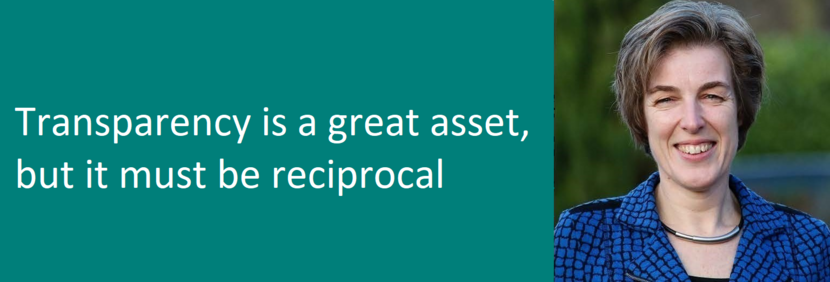Transparency is for both parties
Transparency means that you can see the other. If you look through a glass window, you see the person on the other side, and they see you. The visibility is mutual. It should not be like a scene in a police series with a one-way mirror in the interrogation room.
In society and politics, both national and European, the call for transparency is growing louder. In our field too, transparency – especially in the form of disclosure – is now the order of the day: transparency is gaining more and more prominence. Major steps to achieve transparency have been taken with the Freedom of Information Act, the new Open Government Act and the European General Food Law. Even while an application for approval of an active substance is still being processed, EFSA publishes the underlying studies in the application dossier, so that everyone can see them. And we also publish a lot of information via the Ctgb website.
This transparency is a great asset. Previously, the mere fact that the information in the application dossier was confidential led to suspicion in society. Does an applicant want to withhold information? Have the competent authorities performed a critical and correct assessment? The fact that everyone can now watch the assessment process itself shows the enormous progress in transparency. It is important, however, that we exchange ideas with each other on the basis of a comparable level of knowledge and comparable starting points. And as far as I am concerned there must be some kind of reciprocity in this process. Otherwise we will have a situation comparable to the one-way mirror in the interrogation room at the police station. When applicants and competent authorities share information, but others are unwilling to disclose what they are going to do with this information, there is no real transparency and reciprocity. When we make facts public, we can expect that the facts continue to speak, that the window remains clear and does not become obscure.
In short, we can expect transparency about everyone’s intentions, be they applicants, competent authorities, journalists, NGOs, politicians or consumers. Framing facts in a spurious context that changes the meaning should not be part of this process. We stand for transparency, but we also expect it from others. If everyone is transparent, this promotes the broad sharing of information. Then we will continue to trust each other. Isn't that the underlying goal?
Ingrid Becks
Secretary / Director of the Ctgb


